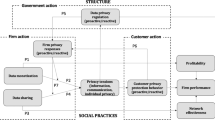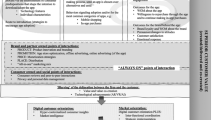Abstract
In today's business environment, the knowledge-based society, globalisation, and information and communication technologies (ICT) have increased the role of "intangible" values of assets and resources for all industries. As a result there is an increased role for knowledge intermediaries; one of these, advertising, plays an important role in affecting consumer choice and knowledge. Ethical issues which arise for traditional purveyors of intangibility – cultural industries such as art, music, or film, spread to advertising. Building on our perspective of the measurement of intangibles we propose a new categorisation of types of goods or services, and a framework for identifying some future ethical challenges in today's global knowledge based society.
Similar content being viewed by others
References
Aoki, M.: 2001, Toward a Comparative Institutional Analysis (MIT Press, Cambridge).
Arrington, R. L.: 1982, 'Advertising and Behavior Control', Journal of Business Ethics 1, 3-12.
Banks, M., A. Lovatt, J. O'Connor and C. Raffo: 2000, 'Risk and Trust in the Cultural Industries', Geoforum 31(4), 453-464
Bohn, R. E.: 1994, 'Measuring and Managing Technological Knowledge', Sloan Management Review (Fall), 110-127.
Bourdieu, P.: 1977, Outline of a Theory of Practice (Cambridge University Press, Cambridge).
Burt, R.: 1992, Structural Holes (Harvard University Press, Cambridge).
CAP (Committee of Advertising Practice): 2003, The British Code of Advertising, Sales Promotion and Direct Marketing, 11th Edition (ASA, Advertising Standards Authority, London).
Calas, M. and L. Smircich: 2002. 'Introduction: Does the House of Knowledge Have a Future?', Organization 8(2), 147-148.
Choi, C. J. and B. Hilton: 1995, 'Client Base, Age and Competitive Advantage in the Services Sector', Journal of Marketing Management 11, 71-82.
Cowan, R. and D. Foray: 1997, 'The Economics of Codification and the Diffusion of Knowledge', Industrial and Corporate Change 6, 595-622.
Darby, M. and E. Karni: 1973, 'Free Competition and The Optimal Amount of Fraud', Journal of Law and Economics 16, 67-88.
Etzioni, A.: 1988, The Moral Dimension (The Free Press, New York).
Etzioni, A.: 1996, 'The Responsive Community: A Communitarian Perspective', American Sociological Review 61, 1-11.
Fombrun, C.: 2000, Corporate Reputation (Harvard Business School Press, Boston).
Giddens, A.: 1998, The Third Way-The Renewal of Social Democracy (Polity Press, Cambridge).
Glazer, R.: 1998, 'Measuring the Knower: Towards a Theory of Knowledge Equity', California Management Review 40(3), 175-194.
Grant, R. M.: 1996, 'Toward a Knowledge-based Theory of the Firm', Strategic Management Journal 17, 109-122.
Harré, R.: 2002, 'Material Objects in Social Worlds', Theory, Culture and Society 19(5), 23-33.
Hassard, J. and M. Kelemen: 2002, 'Production and Consumption in Organizational Knowledge: The Case of the Paradigms Debate', Organization 9(2), 331-356.
Hirsch, P. and M. Lounsbury: 1996, 'Rediscovering Volition: The Institutional Economics of Douglass C. North', Academy of Management Review 21 (book review essay), 872-884.
Huber, G.: 1991, 'Organisational Learning: The Contributing Processes and the Literatures', Organisation Science 2, 88-115.
Inkpen, A. C.: 1998, 'Learning and Knowledge Acquisition through International Strategic Alliances', Academy of Management Executive 12(4), 69-80.
Knight, F.: 1992, Risk and Decisions (University of Chicago Press, Chicago).
Kogut, B. and U. Zander: 1996, 'What Firms Do? Co-ordination, Identity, and Learning', Organization Science 7(5), 502-518.
Kotler, P., G. Armstrong, J. Saunders and V. Wong: 1999, Principles of Marketing, 2nd European Edition (Prentice Hall Europe, London).
Mazzanti, M.: 2002, 'Cultural Heritage as Multidimensional, Multi-value and Multi-attribute Economic Good', Journal of Socio-Economics 31(1), 529-558.
Negus, K.: 2002, 'The Work of Cultural Intermediaries and the Enduring Distance between Production and Consumption', Cultural Studies 16(4), 501-515.
Nelson, P.: 1970, 'Information and Consumer Behavior', Journal of Political Economy 78, 311-329.
Nelson, R. and S. Winter: 1992, An Evolutionary Theory of Economic Change (Harvard University Press, Cambridge, MA).
Nelson, R., M. Donihue, D. Waldman and C. Wheaton: 2001, 'What's an Oscar Worth?', Economic Inquiry 39(1), 1-16.
Nixon, S. and P. du Gay: 2002, 'Who Needs Cultural Intermediaries?', Cultural Studies 16(4), 495-500.
Nonaka, I.: 1994, 'A Dynamic Theory of Organisational Knowledge Creation', Organisation Science 5, 100-130.
North, D. C.: 1990, Institutions, Institutional Change and Economic Performance (Cambridge University Press, Cambridge).
Polanyi, M.: 1966, The Tacit Dimension (Anchor Day, New York).
Senker, J.: 1995, 'Tacit Knowledge and Models of Innovation', Industrial and Corporate Change 4, 100-120.
Skov, L.: 2002, 'Hong Kong Fashion Designers as Cultural Intermediaries', Cultural Studies 16(4), 553-569.
Soar, M.: 2002, 'The First Things First Manifesto and the Politics of Cultural Jamming: Towards a Cultural Economy of Graphic Design and Advertising', Cultural Studies 16(4), 570-592.
Spender, J.-C. and R. M. Grant: 1996, 'Knowledge and the Firm: Overview', Strategic Management Journal 17, 5-10.
Thoburn, N.: 2001, 'Autonomous Production?', Theory, Culture &; Society 18(5), 75-96.
Thrift, N.: 2000, 'Performing Cultures in the New Economy', Annals of the Association of American Geographers 90(4), 674-669.
Weaver, G.: 2001, 'Ethics Programs in Global Businesses: Culture's Role in Managing Ethics', Journal of Business Ethics 30, 3-15.
Weick, K. E.: 1979, The Social Psychology of Organizing (Addison-Wesley, Reading, MA).
Author information
Authors and Affiliations
Rights and permissions
About this article
Cite this article
Millar, C.C.J.M., Choi, C.J. Advertising and Knowledge Intermediaries: Managing the Ethical Challenges of Intangibles. Journal of Business Ethics 48, 267–277 (2003). https://doi.org/10.1023/B:BUSI.0000005788.90079.5d
Issue Date:
DOI: https://doi.org/10.1023/B:BUSI.0000005788.90079.5d




